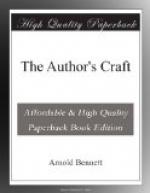There is a numerous band of persons in London—and the novelist and dramatist are not infrequently drawn into their circle—who spend so much time and emotion in practising the rites of the religion of art that they become incapable of real existence. Each is a Stylites on a pillar. Their opinion on Leon Bakst, Francis Thompson, Augustus John, Cyril Scott, Maurice Ravel, Vuillard, James Stephens, E.A. Rickards, Richard Strauss, Eugen d’Albert, etc., may not be without value, and their genuine feverish morbid interest in art has its usefulness; but they know no more about reality than a Pekinese dog on a cushion. They never approach normal life. They scorn it. They have a horror of it. They class politics with the differential calculus. They have heard of Lloyd George, the rise in the price of commodities, and the eternal enigma, what is a sardine; but only because they must open a newspaper to look at the advertisements and announcements relating to the arts. The occasional frequenting of this circle may not be disadvantageous to the creative artist. But let him keep himself inoculated against its disease by constant steady plunges into the cold sea of the general national life. Let him mingle with the public, for God’s sake! No phenomenon on this wretched planet, which after all is ours, is meet for the artist’s shrinking scorn. And the average man, as to whom the artist’s ignorance is often astounding, must for ever constitute the main part of the material in which he works.
Above all, let not the creative artist suppose that the antidote to the circle of dilettantism is the circle of social reform. It is not. I referred in the first chapter to the prevalent illusion that the republic has just now arrived at a crisis, and that if something is not immediately done disaster will soon be upon us. This is the illusion to which the circle of social reforms is naturally prone, and it is an illusion against which the common sense of the creative artist must mightily protest. The world is, without doubt, a very bad world; but it is also a very good world. The function of the artist is certainly concerned more with what is than with what ought to be. When all necessary reform has been accomplished our perfected planet will be stone-cold. Until then the artist’s affair is to keep his balance amid warring points of view, and in the main to record and enjoy what is.... But is not the Minimum Wage Bill urgent? But when the minimum wage is as trite as the jury-system, the urgency of reform will still be tempting the artist too far out of his true path. And the artist who yields is lost.




